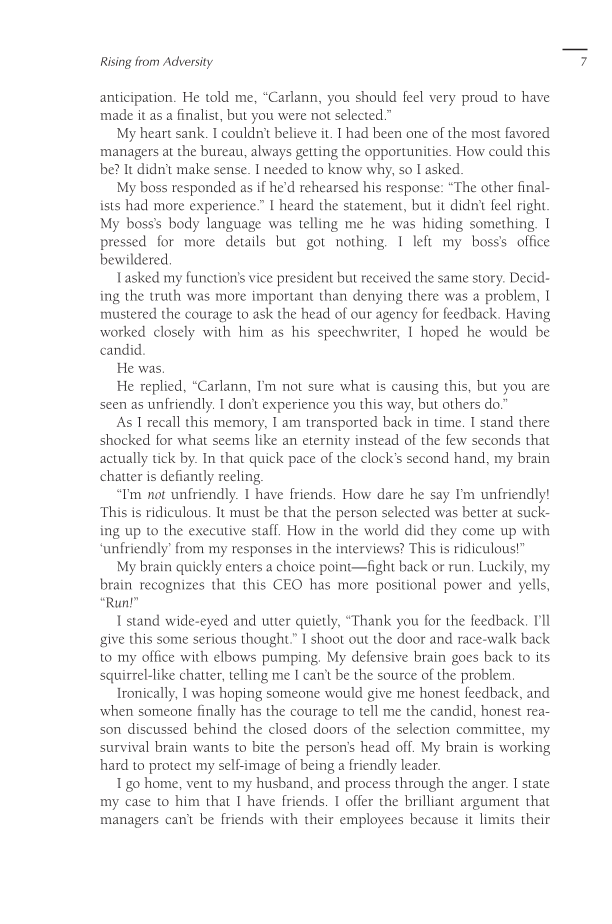Rising from Adversity 7 anticipation. He told me, “Carlann, you should feel very proud to have made it as a finalist, but you were not selected.” My heart sank. I couldn’t believe it. I had been one of the most favored managers at the bureau, always getting the opportunities. How could this be? It didn’t make sense. I needed to know why, so I asked. My boss responded as if he’d rehearsed his response: “The other final- ists had more experience.” I heard the statement, but it didn’t feel right. My boss’s body language was telling me he was hiding something. I pressed for more details but got nothing. I left my boss’s office bewildered. I asked my function’s vice president but received the same story. Decid- ing the truth was more important than denying there was a problem, I mustered the courage to ask the head of our agency for feedback. Having worked closely with him as his speechwriter, I hoped he would be candid. He was. He replied, “Carlann, I’m not sure what is causing this, but you are seen as unfriendly. I don’t experience you this way, but others do.” As I recall this memory, I am transported back in time. I stand there shocked for what seems like an eternity instead of the few seconds that actually tick by. In that quick pace of the clock’s second hand, my brain chatter is defiantly reeling. “I’m not unfriendly. I have friends. How dare he say I’m unfriendly! This is ridiculous. It must be that the person selected was better at suck- ing up to the executive staff. How in the world did they come up with ‘unfriendly’ from my responses in the interviews? This is ridiculous!” My brain quickly enters a choice point—fight back or run. Luckily, my brain recognizes that this CEO has more positional power and yells, “Run!” I stand wide-eyed and utter quietly, “Thank you for the feedback. I’ll give this some serious thought.” I shoot out the door and race-walk back to my office with elbows pumping. My defensive brain goes back to its squirrel-like chatter, telling me I can’t be the source of the problem. Ironically, I was hoping someone would give me honest feedback, and when someone finally has the courage to tell me the candid, honest rea- son discussed behind the closed doors of the selection committee, my survival brain wants to bite the person’s head off. My brain is working hard to protect my self-image of being a friendly leader. I go home, vent to my husband, and process through the anger. I state my case to him that I have friends. I offer the brilliant argument that managers can’t be friends with their employees because it limits their
Document Details My Account Print multiple pages
Print
You have printed 0 times in the last 24 hours.
Your print count will reset on at .
You may print 0 more time(s) before then.
You may print a maximum of 0 pages at a time.


















































































































































































